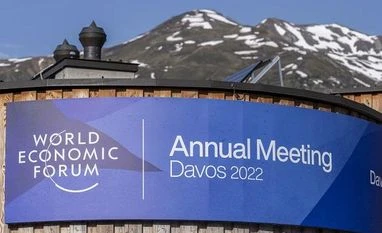The effects of the Russia-Ukraine conflict are being felt at the World Economic Forum’s annual meeting in Davos. The political and business leaders of the world are anxious about Europe’s economic future. Meanwhile, energy shortages and the spectre of economic recession have created a sense of gloom among many business leaders.
Other investment destinations are also looking uncertain. But, India has emerged as a region of both economic dynamism and political stability.
Keen to capitalise on this prevailing mood, India is drawing the attention of global leaders to its reformist decisions and the fast pace at which new unicorns are being minted in the country. Global investors are also keenly assessing what the Indian delegation is bringing to the table at Davos.
Taking place after a two-year pandemic-led hiatus, the ongoing World Economic Forum meeting is now looking at a different world than the last one was. And, that’s a reason for India to find itself in a sweet spot.
According to Shyam Saran, Former Foreign Secretary and Senior Fellow, CPR, Chinese President Xi Jinping was the focus of Davos summit two years ago. Xi Jinping had then presented China as a champion of free trade, while the US under Donald Trump was seen to be on the other side of the fence. But China is not present at the current Davos summit and is on the back foot. Focus has thus shifted to India, says Saran, and India enjoys a potential interest as an alternate investment destination. This has led to the rise of the ‘China+1’ model
So, what is the message that India wants to get across at Davos?
According to Pranjal Sharma of Business Standard, India is presenting itself as a stable, dynamic and growing emerging market at Davos. This is in contrast to the troubles in Europe and the US due to the Ukraine war. He says, the idea is to attract investors worried by the uncertainty in markets and rising inflation. State govts and Centre are aligned in their goal to present ‘Brand India’ assertively at Davos.
Sharma says India is showcasing the growth of its legacy companies and the continuous profits earned by global companies manufacturing in India. India is also advertising the rise of unicorns in the country, he points.
As reported by Business Standard, India has adopted a strategy at Davos that is different from previous years. The delegation, led by Commerce and Industry Minister Piyush Goyal, is focused on improving internal coordination.
“India’s legacy business leaders are mixing with young unicorn founders like Nikhil Kamath of Zerodha, Prashant Pitti of Easemytrip; Ashish Singhal of CoinSwitch and Vidit Atrey of Meesho. This is the first Davos outing for many young entrepreneurs,” Pranjal Sharma says, from Davos.
Before the start of the conference, Goyal had invited all delegates to share their views on India’s positioning. The feedback from the meeting was then incorporated into India’s stance and strategy. A microsite dedicated to India was also created as a resource centre.
Goyal’s team at the Ministry of Commerce and Industry, the Invest India officers and members of the Confederation of Indian Industry are coordinating with state governments to craft a common response on several crucial issues.
Goyal’s ministry is sharing briefing notes with all delegates on issues like, wheat exports and the government’s flagship production-linked incentive schemes. To ensure least-possible confusion about trade and investment numbers, the latest figures have also been made available.
Meanwhile, foreign investors are reportedly fleeing China. As a recent report by The Economist says, Chinese President Xi Jinping’s policies are having a ‘profound’ and ‘painful’ impact on the markets. On the other hand, while India’s growth forecast for FY23 has been slashed in recent days, it has retained its status as an economic bright spot.
So, could something possibly go wrong? Well, there’s a challenge that the Indian delegation at Davos could face while pursuing global investors. It’s the perception, both at home and abroad, that communal tensions are now once again reaching a fever pitch in India.
Reports from the past few months of frequent communal clashes across India could also dampen investor enthusiasm. All of this goes back to one of India’s central claims that we are a politically stable investment destination.
Saran says reports of communal disharmony and sectarian clashes can undermine the India story. This can put the political stability and coherence of India in doubt. He says, the govt must put across the message that it remains committed to the Indian constitution and secularism.
As a recent Business Standard editorial explains, when the government is seeking foreign investments to attain higher economic growth, a frenzied national discourse on some medieval issues is unlikely to enhance India’s attractiveness as an investment destination.
There will be those who would disagree with this prescription. But global investors, who are already facing turmoil on many fronts, might prove to be more risk-averse than before.
)